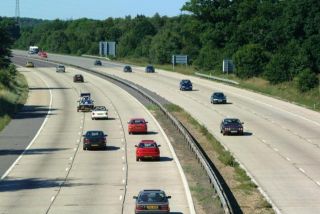
Anxiety
What Does the Lane We Drive in Reveal about Our Psychology?
Why do some drivers stick, limpet-like, to the central lane?
Posted June 19, 2013

Image courtesy of FreeFoto.com
What are you like at motorway driving?
The UK government has recently announced that it intends to clamp down on “middle-lane hoggers”. Motorists caught sticking needlessly to the middle lane on the nation's motorways can now expect a £100 fine and penalty points on their licence.
Amen to that, you may be thinking. After all, you can't argue with the regulations of the Highway Code, which states: “You should always drive in the left-hand lane when the road ahead is clear. If you are overtaking a number of slower-moving vehicles, you should return to the left-hand lane as soon as you are safely past.”
But will beefed-up punishments really persuade the hoggers to abandon their devotion to the middle lane – and thereby reduce the number of accidents? The answer to that question may depend on the answer to another, more fundamental question: namely, why do some of us drive like this in the first place?
Psychological factors presumably have a lot to do with it, though the scientific literature on the topic is sparse (in contrast to the academic attention given to driving at excessive speed).
For some motorists, the failure to switch lanes is probably just the result of a lapse in concentration: absorbed in their thoughts, or the radio, or a conversation with a passenger, they simply forget where they are. For others, cruising along in the middle lane may be a habit they’ve learned from parents or companions.
Certain people, on the other hand, are motivated by what has been called the “shame of the slow lane”. These are drivers who would rather sit in the middle lane and endure the anger, tailgating, and glaring full-beam headlights of fellow motorists than suffer the imagined ignominy of pootling along in the left lane. At work here may be what’s known as a “social comparison process”, in which we define ourselves by reference to the people around us: I’m not one of those sad cases who are too scared to overtake on a motorway. I belong with the confident, capable drivers. Look: I’m in the middle lane!
But perhaps the majority of so-called hoggers are simply attempting to cope with their anxiety about motorway driving. As it happens, and despite the high speeds one can occasionally achieve between the inevitable road works and tailbacks, this kind of motoring is relatively safe. If there is a danger, it often results from changing lanes, and so it's little surprise that some motorists endeavour to do as little of it as possible.
This is what psychologists would call a safety behaviour: an action we take in order to prevent the occurrence of whatever we happen to be afraid of. The problem is, if a driver avoids changing lanes, they deprive themselves of the opportunity to see that there’s nothing to worry about. They don’t build up any confidence. And so their anxiety persists. Bombing along in the right-hand lane is unlikely to appeal to these motorists, and the left hand lane carries the risk of becoming penned in by a stream of slow-moving lorries and hence having to overtake. And thus the middle lane is where they stay, come what may.
How many people suffer from this kind of driving anxiety isn’t known, but it seems likely to be common. What causes it? Again, research is patchy.
We do know that people who’ve witnessed or been involved in traffic accidents are – understandably – prone to driving-related fears. It’s also plausible that inexperienced or infrequent motorway drivers may be more worried about pulling out into faster-moving traffic, and thus prefer to stay in the middle lane, than those with many hundreds of thousands of miles on their clock. For some elderly drivers, on the other hand, worries about a possible decline in their driving skills may lead them to lane-hog.
But is a limpet-like adherence to the middle lane really a safe strategy? Might the monotony induce “highway hypnosis” – that dazed loss of concentration that can so easily result in accidents? Perhaps, but our guess is that the anxious driver is more likely to be gripping the wheel in a sweaty state of high alertness.
Quite how effective the proposed sanctions will be in dealing with each of these types of hogger is open to question. Certainly the risk of getting caught is sure to have a bearing: if no one you know has ever been punished for lane hogging, changing your own behaviour probably won't seem a pressing priority. Nevertheless, helping drivers to overcome their anxiety and slow-lane shame is likely to require subtler, more targeted, and more constructive measures than a £100 fine. In the mean time we suggest the development of a psychology of the middle of the road – perhaps with the songs of Chris Rea as a soundtrack.
Follow Daniel and Jason on Twitter: @ProfDFreeman and @JasonFreeman100.



